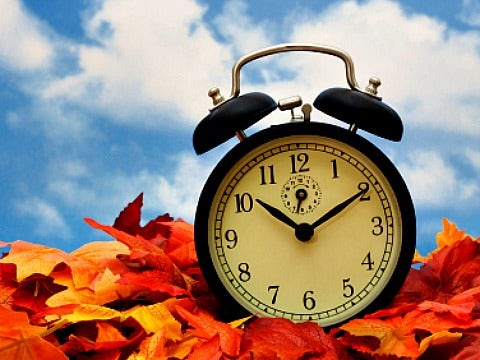
Tomorrow we roll back the clocks, and it could affect more than just your sleep schedule.
By Diana Marie Collins — Written on Nov 02, 2012

The days are getting darker earlier, and you know what that means: Daylight Savings Time (DST) is coming to an end. Sunday morning, we roll back our clocks from 2AM to 1AM (or, you know, when whenever we go to bed tonight). While we'll gain an extra hour of sleep, we'll also lose a precious hour of daylight until DST begins again in March. So, why do we even do this time change thing twice a year? And more importantly, could it possibly affect our relationships, as some say?
DST has been around for a while. Benjamin Franklin first proposed the concept of waking up earlier to take advantage of the daylight to save candles and conserve fuel and energy for the war, says Dr. David Prerau, author of Seize the Daylight: The Curious and Contentious Story of Daylight Savings Time. Today, we continue the tradition because it benefits public health, reduces crime and saves energy.
But the time change can also impact your love life, say experts, in both negative and positive ways. "[DST] forces people to spend more time together," says marriage and relationship expert Denise Wade, Ph.D., "particularly in the colder states in the Northeast where it’s not only darker earlier, but it’s colder. You’re forced to do more indoor activities together."
The end of DST also has a direct effect on the hormone levels in your body, says Dr. Wade, which could be helpful for some. "There’s a benefit when your serotonin increases. You become a little bit calmer. This is beneficial to resolving arguments, especially when you’re in a relationship," she says.
When daylight savings time ends, human nature also kicks in. "There’s a primal instinct in us too that goes back to our cave-dwelling ancestors," explains Dr. Wade. "As a survival trait, when the sun would go down and it got colder, we would crave more food and more human touch." Another bonus of DST? "Going to bed earlier leads to more cuddling," says Dr. Wade.
Still, for those who are prone to winter depression, or seasonal affective disorder (SAD), the end daylight savings time could signal trouble for their emotional health and their relationships. Dr. Prerau says, "When daylight savings time starts in the spring, people are happier. It’s the beginning of a new season, even a time for new relationships to begin. When it ends, many people feel depressed."
The hormonal change in your body could also have a detrimental affect on your love life. "Serotonin increases when it’s colder and darker, while dopamine increases when we have more light and more warmth," explains Dr. Wade. She warns that while people who are balanced can handle the fluctuations of the changing seasons, people who are unbalanced or seasonally depressed need to increase their levels of dopamine. To counteract this affect, she recommends increasing physical activities to release endomorphins and get adrenaline pumping. "Any kind of exercise or excitement to give you stimulation will make you happier," says Dr. Wade. "You should also spend more time with family, friends and especially your significant other. Bonding helps stimulation of dopamine."
Certified Sex and Relationship Psychologist Megan Fleming, Ph.D.,adds that light treatment therapy and an increase in vitamin D may also help those prone to seasonal depression when daylight savings ends. Dr. Fleming reminds anyone who may be experiencing symptoms to seek treatment. "You shouldn’t suffer in silence," says Dr. Fleming. "Neither should your relationship."
More juicy stories from YourTango:
Hard Work Ahead: Are Relationships Really Worthwhile?
THIS Is The Kiss Of Death For Relationships
Related Stories From YourTango:
Why Your Relationships Only Last 3 Months
